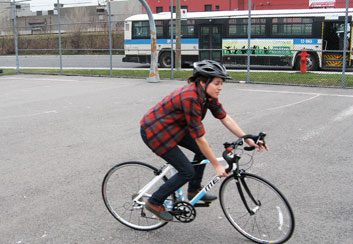Review: Are MEC’s new bikes worth the price?
Guest blogger Drew Nelles, associate web editor for readersdigest.ca and bike aficionado, gives us the scoop on Mountain Equipment Co-op’s

Guest blogger Drew Nelles, associate web editor for readersdigest.ca and bike aficionado, gives us the scoop on Mountain Equipment Co-op’s new line of bikes. Thanks for the tips, Drew!
Mountain Equipment Coop’s new line of bikes, made available across Canada this week, has been a long time coming. As a retailer of goods targeted towards both young, professional weekend warriors and the granola-crunching set, cycling seems like a natural fit for MEC. After all, the Vancouver-based non-profit has been selling bike accessories since 1978; why shouldn’t it make its own bicycles, too? MEC, however, is not just a retailer’it’s a sort of well-meaning behemoth, and its foray into cycling has drawn heat from the fiercely independent bike community.
Smaller bike retailers complain that MEC, as a cooperative, pays lower tax rates than its for-profit competitors, giving it an unfair advantage over independent stores. “They’re contributing less to the tax pool, whether it be health care, or bike paths or education, than small community businesses do,’ one business owner complained to the CBC, while another compared MEC to Wal-Mart. In any other industry, these kinds of protests might not matter. But MEC has a squeaky-green image to maintain.
I went to the Montreal launch of the bike line last Tuesday to try them out myself. With 12 new bikes set up for display, journalists geeked out over parts and jargon like carbon-fibre forks and flip-flop hubs, while Tim McDermott, MEC’s bike project manager, introduced the line. ‘Cycling is a great gateway activity,’ he said. ‘It’s easy to do and anyone can do it. People who get into cycling expand from that.’
MEC’s new bikes are pretty’perhaps too pretty. The adult models range in price from $650 to $1,400, making them impossible to lock up to your front gate without fear of theft. But they’re well equipped; McDermott showed off one of the smartest features of the collapsible Origami city bike: a seat post that doubles as a tire pump.
Eventually I decided to try out the Côte, a multi-purpose road bike built for both touring and urban commuting. (My friend Rachel tried out the Côte, too. That’s her in the picture, taking it for a spin.) There was an initial hiccup’the cable wasn’t properly threaded through the front derailleur’and the brakes weren’t as responsive as I expected. But these sorts of problems are easily fixable in-store (MEC’s bikes are built in Taiwan and assembled in Canadian outlets’begging the obvious question of why a ‘socially-responsible’ company is outsourcing to the developing world).
The Côte rode cleanly and quickly as a group of us biked around northern Montreal. It couldn’t compare to the Col, though: MEC’s most expensive bike is also its fastest and lightest. Weighing in at 8.6 kilograms, the Col felt like air underneath me. There were more than a few jokes about simply riding off on it and never coming back. I also tried out the Skyway, MEC’s fixed-gear bike. Riding fixie is always fun, even when you’re lousy and couldn’t skid-stop if your life depended on it. But no true fixed-gear rider would be caught dead on a Skyway; not only does it have both front and back breaks, it also has a flip-flop hub, meaning you can ride it as a standard one-speed freewheel. Prepare to face the mockery of any bike messenger you come across.
MEC is far from the first large retailer to wade into bike sales, but it has touched a nerve because its do-gooder ethos seems at odds with its expansionism. MEC’s bikes are well built and fun, but there are plenty of other ways to get your hands on a new ride.
Related:
‘ How to tune up your bicycle
‘ The benefits of biking
‘ How to adjust your bicycle




